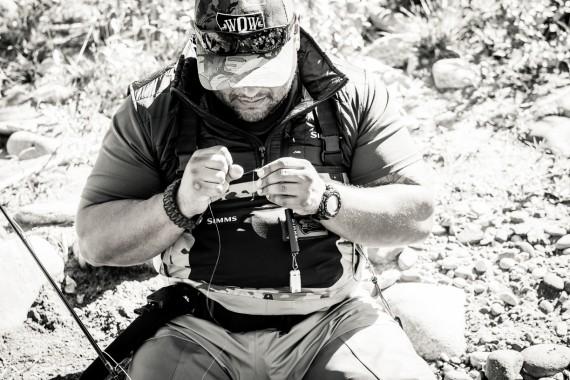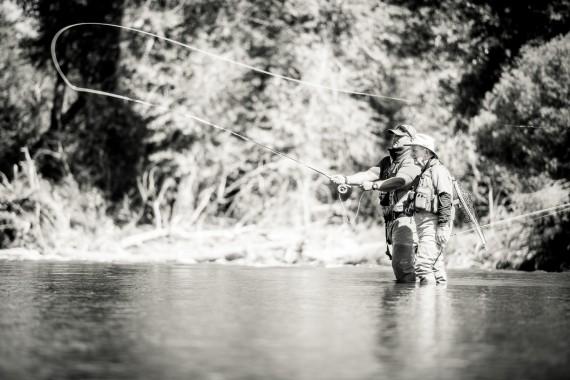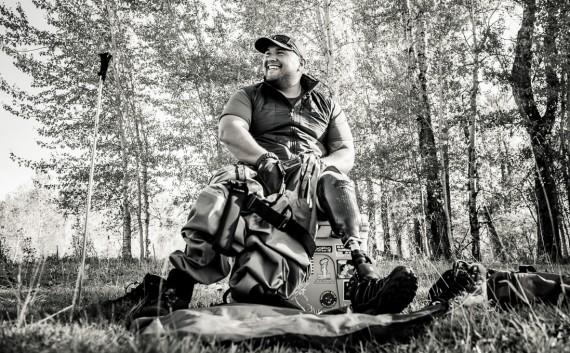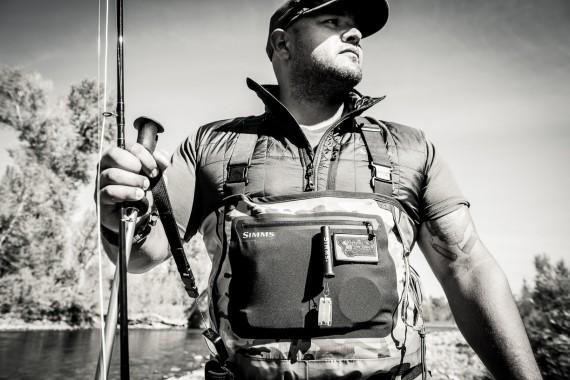Fishing Is Healing Behind the Journey of a Warrior
Reposted from the Simms Wading Room
Meet Saul Martinez, retired Army infantryman and Purple Heart recipient and learn how fly fishing changed him forever.
When the attacks on the United States occurred on September 11, 2001, Saul Martinez was a high school sophomore in Bloomington, California. As a young adult, Martinez carried a deep appreciation and strong sense of patriotism for the United States that naturally lead to a growing curiosity about the military. After the attacks on his country, it was no longer a question of if he was going to enlist; it was a matter of when. Now a medically retired Army Infantryman and Purple Heart recipient, Martinez, along with his wife and children, resides in Bozeman, Montana. We sat down with Saul to talk about his time in the service, his love for fishing and how Warriors and Quiet Waters Foundation (WQW) steered his life in a direction he didn’t know he needed to go. Learn more about Simms’ new G3 Guide™ Wader – WQW Limited Edition and how it benefits Warriors and Quiet Waters.
Simms: So can you tell us how you ended up from SoCal to Bozeman?
Martinez: I actually came to Bozeman as a Warriors and Quiet Waters participant in 2009. That was my first exposure to Montana and, obviously, Bozeman and I just immediately fell in love with everything about it. The scenery, the water, the fishing, the people.
Simms: What did you expect to find in Southwest Montana when you arrived?
Martinez: Honestly, I really didn’t have any knowledge of the area. I knew it was suppose to be beautiful just from photos I had seen, but I expected for nobody to be here. Really, all I had heard was that it was beautiful wide open country and very sparsely populated and that was really appealing to me.
Simms: Did you fish before getting accepted as a WQW participant?
Martinez: Not really. I mean I did here and there but it wasn’t a part of my life and when it was, it wasn’t really about the fishing. It was more about spending time with my family that I didn’t get to see that much.
Simms: Can you tell us how you became acquainted with WQW?
Martinez: Sure. I was a squad leader at the Warrior Transition Unit (WTU) in Balboa Naval Medical Center and as it turns out, that was one of the main locations for recruiting for WQW. Because I was there, I knew about WQW from their presence at the hospital. Since I was still on active duty and actively engaged in an occupation in the army, it was hard for me to find the time to participate but it always caught my eye.
Simms: What was the experience like for you?
Martinez: You know, even before we got on the water, learning how to cast and what not, I just felt like something was going on inside me. The first day on the water really allowed me to embrace certain feelings I was having. The biggest thing WQW did for me is it gave me the opportunity to come here and experience emotions and feelings that I hadn’t felt since my injury. The whole week, I was able to take that experience and kind of put it in a little compartment right inside my heart and tap into it when I needed to. It gave me the ability not only to know what it felt like to trust and to feel that sort of calmness but also to be with my feelings and embrace what I had been through. I don’t know, it was just different, being on a river and fishing just gave me a real sense of peace. When I got back to California, it was really hard to know how to feel those emotions.

Simms: Can you tell us a little bit about your injury?
Martinez: Of course. It was 2007 during my first deployment. I was in a Humvee escorting our Brigade Commander to a meeting in another province. About 30 minutes into the convoy, we got hit by a multiple charge EFP IED (Explosively Formed Penetrator Improvised Explosive Device). I lost two good buddies in that hit, Blake Stevens and Kyle Little.
Simms: Saul, I can’t even remotely begin to imagine what that must have been like.
Martinez: Yeah, everybody handles it different. It’s not a cookie cutter type response. As a bilateral amputee, it was definitely tough but not as tough as the mental aspect. I found myself just kind of going through the motions of life. The only thing that I never stopped caring about was my family. All I can say is that I wouldn’t be anywhere without my wife Sarah, my family and my friends. Support from my family and friends who are also vets who had gone through similar events was everything. It took a lot of work and I couldn’t have done it alone.
Simms: What is it in your mind about being on the water that is so therapeutic/healing or whatever you want to call it?
Martinez: The connection and effect the water has on people differs. But, I think that for me and others who have gone through severe trauma, it’s just that it’s the exact opposite of what plays out in my head on a daily basis. It’s easier for me to embrace what’s going on in my head when I’m out on the river. When I’m out there, I’m in an environment that I feel comfortable pondering what I’ve been through because, like I said before, it’s an environment of safety and serenity. On the river, I can embrace it and be with it because it’s an environment that allows it.
Simms: So do you have a favorite piece of water out here?
Martinez: You know, I love it all, but I have to say I have a soft spot for the Yellowstone River and Paradise Valley. Even though I’ve been skunked on it more than once.
Simms: Hahaha, well, I don’t think you’re the only one who loves the Yellowstone who has experienced hit or miss days. So would you say you prefer to fish from the boat?
Martinez: Again, I love it all, but I’d have to say lately I’ve really been into wading. I think I’m in a stage of my recovery where I’m way more confident in my stability and ability to wade. Even two years ago, I didn’t have that strength and balance, I could do a bunch of other things but for whatever reason, wading never clicked like it has lately. There was one day this year where I just kind of woke up and said “You know what, I’m gonna frikkin wade today.” After that day, I’ve been doing it a lot more. The connection you have when you are standing in the water is incomparable, you’re not floating on it, your in it, touching it, you’re at its mercy.

Simms: Now that you’re in Bozeman, you are currently working for WQW, right?
Martinez: I am. I’m the Director of Warriors Services for WQW which means I have a lot of functions and responsibilities. I’d say the main obligations I have are recruiting and evaluating individuals who could potentially benefit from our program the most.
Simms: Once accepted, what’s the general program for a WQW participant.
Martinez: Well, they arrive on Monday and we take them somewhere local for lunch and from there, we take them to Simms. At Simms, they get outfitted head-to-toe with boots, waders, layers and rain gear and then we come back and have dinner. Tuesday, we start what we call Fly Fishing 101 where our Director of Operations, Lawrence Stuemke gives initial instruction on casting and the basic functions of their fly fishing gear. After that, the warriors fish on a stocked pond so they can get a feel for what it’s like to have a fish on. We also assign participants to a guide and a companion. On Wednesday, the guide chooses a float and the warriors get a full day of fishing on one of our blue ribbon rivers. Thursday, we load up on a tour bus and check out Yellowstone and see some other sites. On Friday, the guides once again choose another float and the warriors get another full day on the water. The week closes with what we call a syanora dinner on Friday where guys have the opportunity to say a few words or give a testimonial and Saturday they fly home.
Simms: Over the years, what has WQW meant to you?
Martinez: Participating in 09 legitimately changed my life. I really don’t know what else I can say, WQW has played a huge role in my recovery. Getting involved with WQW steered my life in a direction I didn’t know I needed to go and I can’t imagine my life without it.


